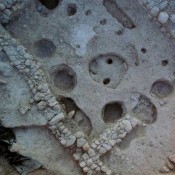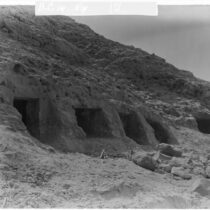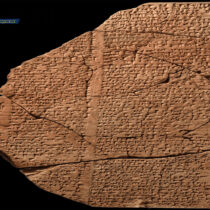A fragment of the asteroid that hit the Earth 66 million years ago and led to the extinction of the dinosaurs, and the first ever fossilised remains of a dinosaur killed by the asteroid impact, are thought to be amongst the latest finds unearthed by University of Manchester palaeontologist Robert DePalma at a dig site he named Tanis in North Dakota.
These ground-breaking discoveries could provide the first ever physical evidence that dinosaurs were killed by an asteroid strike at the end of the Cretaceous. Never before has a dinosaur victim of the asteroid strike been found.
Alongside other extraordinary treasures, these finds will feature in a new 90 minute film– Dinosaurs: The Final Day with David Attenborough which airs on 15 April on BBC One and iPlayer.
University of Manchester palaeontologists first announced their stunning finds at the Tanis site in 2019 and uncovered a ‘treasure trove’ of geological records to help paint the picture of the final days of the dinosaurs.
Other finds include an incredibly rare pterosaur egg with the fossilised bones of a baby pterosaur inside; a fossilised burrow likely to have been made by an early mammal such as a Pediomyid – and beautifully preserved Triceratops skin, which is exceedingly rare in the Hell Creek Formation.
All the discoveries that feature in the documentary help build a detailed picture of what life was like at Tanis at the end of the Late Cretaceous – the very end of the dinosaurs’ 165 million year reign. With exclusive access to DePalma’s dig over three years, this film brings to life, in unprecedented detail, the lost world of the last days of the dinosaurs; revealing, in compelling CGI scenes, what happened when the asteroid struck the planet.
In the programme Sir David Attenborough joins DePalma and Professor Phil Manning of The University of Manchester, as they investigate ejecta spherules from Tanis which have been preserved in amber. Further analysis shows one spherule appears to have a fragment inside which could be a microscopic piece of the asteroid itself, perfectly preserved inside the spherule for 66 million years. Described by Prof Manning as something that could be “a piece of the bullet that killed the dinosaurs”, this could be physical evidence linking the Tanis dig site to the Chicxulub impact.
“This is the most incredible thing that we could possibly imagine here, the best case scenario….The one thing that we always wanted to find in this site and here we’ve got it„ Robert DePalma
The cameras also capture the moment DePalma and his team unearth the leg of a small, herbivorous dinosaur called a Thescelosaurus, a dinosaur that itself may have witnessed the cataclysmic impact. This is the first time that the fossil of a dinosaur that appears to have been killed by the asteroid impact has been uncovered.
Robert DePalma says: “This is the most incredible thing that we could possibly imagine here, the best case scenario….The one thing that we always wanted to find in this site and here we’ve got it”. Robert DePalma has been digging at Tanis for a decade, and Dinosaurs: The Final Day with David Attenborough captures the moments he and his team come across the extraordinary finds that help us piece together what happened, hour by hour, on the day the dinosaurs were wiped out.
The programme also follows Robert as he examines a fossilised pterosaur egg at a research facility in Oxfordshire, the Diamond Light Source Synchrotron. The baby is still inside the egg and scans reveal that the pterosaur may have been able to fly shortly after hatching, and that some pterosaur eggs were soft-shelled, like those of turtles.
Dinosaurs: The Final Day combines stunning CGI storytelling, not only to animate Tanis and these discoveries, but also to transport David Attenborough back to the Late Cretaceous. It is based upon the remarkable evidence unearthed by Robert and his team at Tanis, which brings to life in more detail than ever before, the lost world of the last days of the dinosaurs and uncovers the mystery of what happened when the Chicxulub asteroid collided with Earth.





